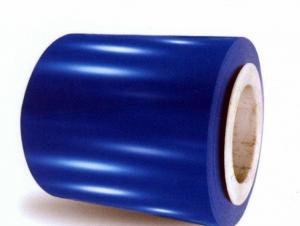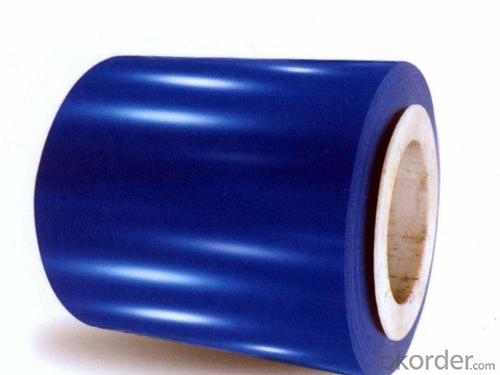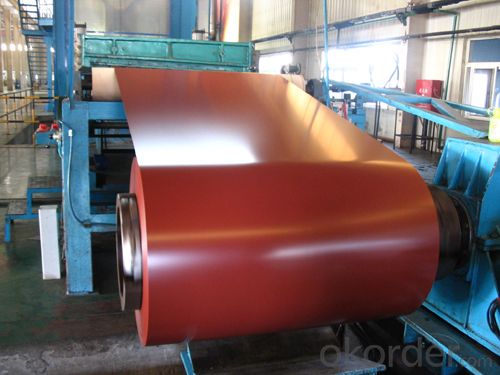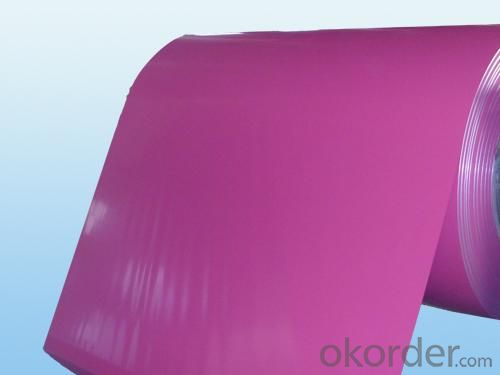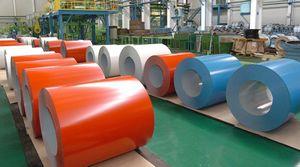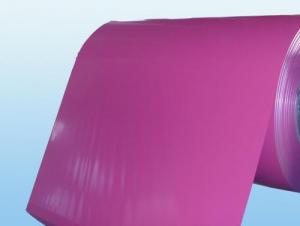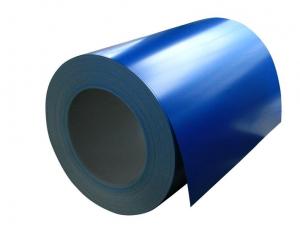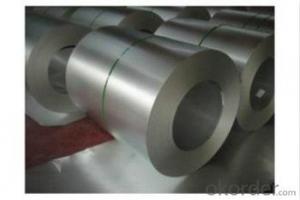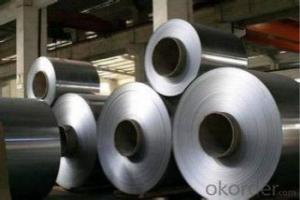Quality Aluminum Coil - PVDF Color Coated Aluminium Coil AA3003 Temper H14
- Loading Port:
- China Main Port
- Payment Terms:
- TT or LC
- Min Order Qty:
- -
- Supply Capability:
- -
OKorder Service Pledge
OKorder Financial Service
You Might Also Like
1.Structure of Product Description
PVDF Color Coated aluminium coils are widly used in decoration in the open air. The painting can last about 15-20 years. Now many Asian countries are choosing this product instead of steel products. For the painting brand, we can provide China brand, North American PPGI and European brand Becker. Usually our customers from European prefer Becker.
2. Main features of the product
a.Competitive price--CNBM have own mills, so we can provide more competitive price than those small suppliers.
b.Professional after-sale service--We have more than 20 years exportation experience, you can get most professional service from CNBM.
c.Fast delivery time--Usually our delivery time is about 30 days.
3. Image
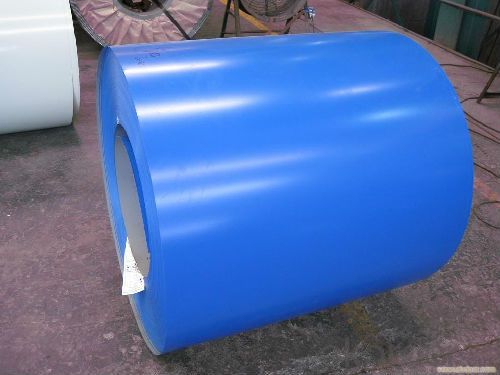
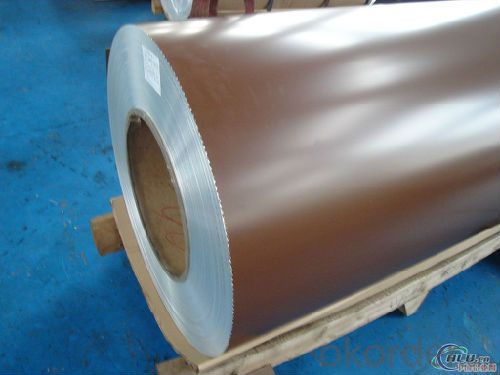
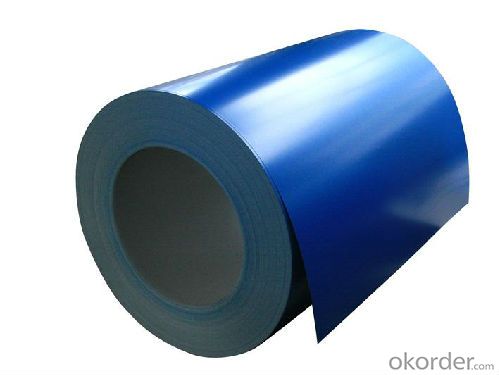
4.Product Specification
| Alloy | Temper | Painting | Coil ID | Coil Weight | Last Time |
| AA3003 | H14 | PVDF | 505MM | Max 2.65 tons | 15-20 years |
5.FAQ:
What is the quality standard?
---Usually our standard is GB3880-2006
What is the largest width?
---It is 2300mm
What is your MOQ for this product?
---Usually we can do 5 tons for every size.
- Q: Are there any limitations on the coil flatness of aluminum coils?
- Yes, there are limitations on the coil flatness of aluminum coils. The flatness is influenced by factors such as the thickness, temper, and alloy of the aluminum, as well as the manufacturing process. While manufacturers strive for optimal flatness, it is important to note that perfect flatness is difficult to achieve.
- Q: Are aluminum coils suitable for architectural roofing?
- Yes, aluminum coils are suitable for architectural roofing. Aluminum is a lightweight and durable material that offers excellent corrosion resistance and longevity. It is also highly malleable, allowing for flexibility in design and installation. Additionally, aluminum coils can be easily formed into various profiles and shapes, making them ideal for architectural roofing applications.
- Q: so i've been using natural deodorants that don't have aluminum, but they only work for a little while. i've heard that aluminum may cause Alzheimer's, and i have a history of Alzheimer's. do you know of any web sights that can confirm/deny this? or if you know of any deodorants that work really well that don't have aluminum! this is really getting annoying
- it depends. in some people it is and others it is not. when you wear deodorant, the aluminum goes into your blood stream. just think about that
- Q: which metal is very common today and which one will be most common in future. steel or aluminum
- Steel is definitely most common engineering material. Aluminum is lighter and is finding increasing use in transport industry due to energy cost and global warming. It is unlikely that it will surpass steel ever in future due to higher cost. Magnesium has the potential of growing to beat both of these metals (magnesium is more abundant on earth than either aluminum or iron (steel).
- Q: What is the typical elongation of aluminum coils?
- The elongation of aluminum coils can vary depending on various factors, including the specific alloy and temper of the aluminum, the manufacturing process, and the intended application. However, aluminum coils generally have a high capacity for elongation. On an average basis, aluminum coils can stretch or deform by approximately 5-15% without fracturing or breaking. This is possible due to the inherent ductility of aluminum, which enables it to be easily shaped and formed without compromising its structural integrity. The elongation of aluminum coils plays a significant role in multiple industries, such as construction, automotive, and aerospace, where the material is commonly utilized. This characteristic allows for efficient fabrication procedures, including bending, rolling, and stamping, to create intricate and precise shapes. It is important to highlight that the elongation of aluminum coils can be further enhanced through the incorporation of specific alloying elements and heat treatments. These processes can improve the material's properties, making it even more suitable for demanding applications that require exceptional strength, ductility, and elongation capabilities. To accurately determine the elongation properties for a specific application, it is crucial to consider the particular alloy, temper, and manufacturing processes involved. In conclusion, while the typical elongation of aluminum coils ranges from 5-15%, a comprehensive evaluation of these factors is necessary.
- Q: Are aluminum coils suitable for coil winding applications?
- Yes, aluminum coils are suitable for coil winding applications. Aluminum has several advantages that make it a popular choice for coil winding. Firstly, aluminum is lightweight, which makes it easier to handle and transport. This is particularly beneficial in industries such as automotive and aerospace where weight reduction is a priority. Additionally, aluminum has excellent conductivity properties, which ensure efficient electrical current flow within the coil. This is important for applications that require high performance and low resistance, such as in transformers and electric motors. Furthermore, aluminum is highly resistant to corrosion, making it suitable for outdoor and harsh environments. It does not rust like other metals, such as steel, and can withstand exposure to moisture and chemicals. Another advantage of aluminum coils is their cost-effectiveness. Aluminum is generally more affordable than other metals like copper, which is commonly used in coil winding. This makes aluminum coils a cost-efficient option for various industries. However, it is important to note that aluminum has a lower electrical conductivity compared to copper. Therefore, in certain applications where high conductivity is crucial, such as in power transmission, copper coils might be more suitable. Nonetheless, aluminum coils offer numerous benefits and are widely used in many coil winding applications.
- Q: Are aluminum coils suitable for signage applications?
- Yes, aluminum coils are suitable for signage applications. They are durable, lightweight, and resistant to corrosion, making them ideal for outdoor signage. Additionally, aluminum coils can be easily shaped and molded, allowing for various design possibilities in signage applications.
- Q: Who knows about how much money can be sold in a three metre high similar aluminum door?
- Aluminum is not valuable now. Look at it
- Q: How do aluminum coils compare to plastic coils in terms of durability?
- Aluminum coils are generally more durable than plastic coils. They are resistant to corrosion and can withstand high temperatures, making them suitable for various applications. Plastic coils, on the other hand, are more prone to wear and tear, especially in harsh environments or with heavy usage. While both types have their own advantages, aluminum coils are generally considered to be more durable in the long run.
- Q: What are the common quality control measures for aluminum coil manufacturing?
- To ensure the production of high-quality aluminum coils, various quality control measures are implemented throughout the manufacturing process. These measures include: 1. Thoroughly inspecting the raw materials, specifically the aluminum alloy used for the coils, to identify any impurities or defects that could impact the final product. 2. Conducting dimensional inspections at different stages of the manufacturing process to ensure that the aluminum coils meet the required specifications in terms of thickness, width, length, and diameter. 3. Inspecting the surface of the aluminum coils for visual defects like scratches, dents, or marks, either through visual examination or specialized equipment such as cameras or scanners. 4. Testing the mechanical properties of the coils, including tensile strength, yield strength, elongation, and hardness, to ensure that they meet the necessary strength and performance requirements. 5. Regularly analyzing the chemical composition of the aluminum alloys used to manufacture the coils to ensure compliance with specific standards and identify any deviations that may affect the quality of the final product. 6. Inspecting the coating applied to the aluminum coils, if present, to ensure uniformity, adhesion, and thickness. This is important for proper corrosion resistance and an appealing aesthetic appearance. 7. Conducting packaging inspections before shipment to ensure that the coils are properly packed, labeled, and protected during transportation, while also checking for any damage or contamination that may have occurred during the packaging process. By implementing these quality control measures, any defects or deviations in the manufacturing process can be identified and rectified, thereby ensuring that the aluminum coils meet the required standards and customer expectations.
Send your message to us
Quality Aluminum Coil - PVDF Color Coated Aluminium Coil AA3003 Temper H14
- Loading Port:
- China Main Port
- Payment Terms:
- TT or LC
- Min Order Qty:
- -
- Supply Capability:
- -
OKorder Service Pledge
OKorder Financial Service
Similar products
Hot products
Hot Searches
Related keywords
